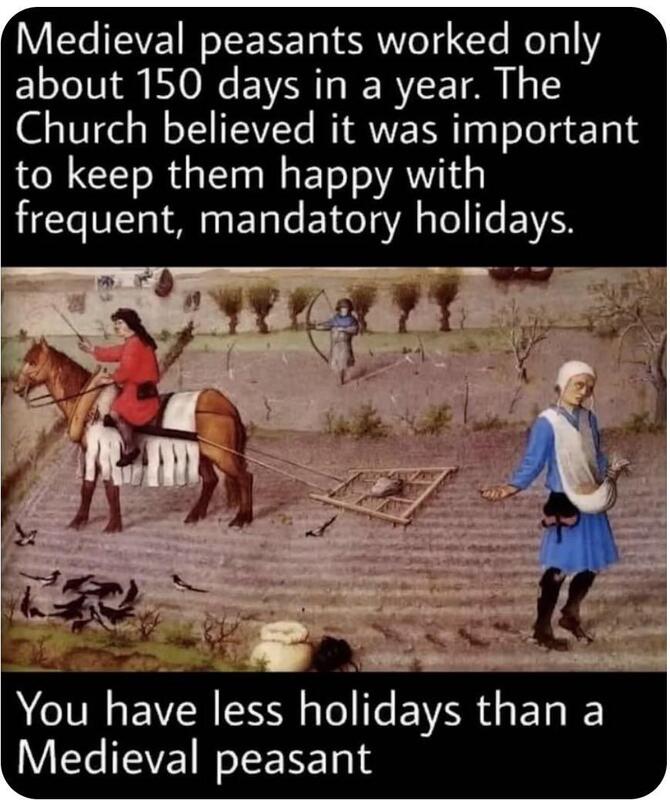Lemmy Shitpost
Welcome to Lemmy Shitpost. Here you can shitpost to your hearts content.
Anything and everything goes. Memes, Jokes, Vents and Banter. Though we still have to comply with lemmy.world instance rules. So behave!
Rules:
1. Be Respectful
Refrain from using harmful language pertaining to a protected characteristic: e.g. race, gender, sexuality, disability or religion.
Refrain from being argumentative when responding or commenting to posts/replies. Personal attacks are not welcome here.
...
2. No Illegal Content
Content that violates the law. Any post/comment found to be in breach of common law will be removed and given to the authorities if required.
That means:
-No promoting violence/threats against any individuals
-No CSA content or Revenge Porn
-No sharing private/personal information (Doxxing)
...
3. No Spam
Posting the same post, no matter the intent is against the rules.
-If you have posted content, please refrain from re-posting said content within this community.
-Do not spam posts with intent to harass, annoy, bully, advertise, scam or harm this community.
-No posting Scams/Advertisements/Phishing Links/IP Grabbers
-No Bots, Bots will be banned from the community.
...
4. No Porn/Explicit
Content
-Do not post explicit content. Lemmy.World is not the instance for NSFW content.
-Do not post Gore or Shock Content.
...
5. No Enciting Harassment,
Brigading, Doxxing or Witch Hunts
-Do not Brigade other Communities
-No calls to action against other communities/users within Lemmy or outside of Lemmy.
-No Witch Hunts against users/communities.
-No content that harasses members within or outside of the community.
...
6. NSFW should be behind NSFW tags.
-Content that is NSFW should be behind NSFW tags.
-Content that might be distressing should be kept behind NSFW tags.
...
If you see content that is a breach of the rules, please flag and report the comment and a moderator will take action where they can.
Also check out:
Partnered Communities:
1.Memes
10.LinuxMemes (Linux themed memes)
Reach out to
All communities included on the sidebar are to be made in compliance with the instance rules. Striker
view the rest of the comments

Fourth, some of the comestibles and important resources (wood, mostly) had to be collected in the nearby area. Looking for kindling, wood (usually deadwood, as chopping trees in a forest usually required lord's permission), berries, honey, and mushrooms was a common activity in season and more often than not was also treated as a pastime and an occasion to move away from the homestead. The diet was also enriched by fish if the river or lake was located nearby and in most areas peasants were able to hunt wild birds in the fields (hunting game was generally a lord's privilege). Fishing and hunting were also time-consuming activities.
Fifth, peasants were commonly required to do some work on their lord's behalf. These could include anything related to the maintenance and creation of the local infrastructure - forest clearing, road maintenance, transport etc. It should be remembered that with the transportation limited to the carts drawn by horses or oxen, a seemingly simple work such as moving lumber from the forest to a sawmill or a nearby construction site could have taken weeks, due to low speed and capacity of the vehicles, not to mention that loading the cargo had to be done entirely by hand.
Sixth, the house and other buildings had to be maintained regularly, what usually required repositioning and replacing thatch bundles (especially after a strong wind), filling gaps between logs or replacing crumbling daub, repairing occasional damages caused by animals etc.
Last but not least, there were a lot of holidays, generally matching the number of 'free days' nowadays. On Sundays and ecclesiastical holidays peasants were generally visiting the local church and taking part in the ceremonies, often accompanied with local festivities in case of larger events. The latter also required at least some preparation what was adding to an already busy peasant's schedule. Additionally, any visit of the local lord or his representative due to some administrative work (e.g. judicial proceedings in case of any criminal action or contested claim) were also drawing attention of the entire village and were an local event in its own right.
So, to sum it up, free medieval peasants and craftsmen were not required to 'go to work', as they were essentially sole traders, who had more or less full control over their work and income, but unlike modern people in developed countries, they also spent much more time on various activities we now either do not perform or take for granted. In other words, modern people go to work to get money they use to pay for almost everything they need (e.g. they usually delegate such work to others). Medieval sustenance agricultural work was usually seasonal and less time-consuming overall, but everything else, from daily house chores to procurement of various goods required a lot more time and effort, often much more than the 'work' associated with agriculture. Thus, it is not incorrect to say that medieval peasants had much more work on their hands than modern people.
Bennett, J., A Medieval Life: Cecilia Penifader of Brigstock, c. 1295-1344, McGraw-Hill, New York 1998.
Hutton, R., The Stations of the Sun: A History of the Ritual Year in Britain, Oxford University Press, 1996.
Voth, H-J., Time and Work in England 1750-1830, Oxford University Press, 2001.